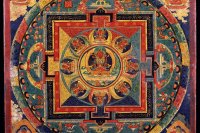A few weeks ago, my sixteen year-old cousin asked her Confirmation advisor whether people who don’t believe in Catholicism go to Heaven.
“No,” he replied. “They go to Hell.”
My cousin was deeply troubled. She went home and told my aunt, “I don’t know if I can believe in a God who would send friends of mine to Hell for not believing what I believe.”
Her reaction makes me happy. Who would want to believe in such a God?
Who would celebrate a supposedly all-knowing, infinitely benevolent Creator who casts the majority of His beloved children into an abyss of eternal fire and brimstone?
I would hope that no one would, but it seems that this isn’t the case. It seems that a man who purports to be a mentor for my impressionable cousin is happy to do so.
And there’s something very wrong with this.

Photo Credit: Fady Habib (Creative Commons)
Recognize That Some Doctrine is Antiquated
The words of my cousin’s supposed mentor sound like a scare tactic or a threat. He might as well have said, “Don’t even think about not believing in the one true God or you’ll sign your ticket to Satan’s endless torture chamber.”
Some people might tell me that I can’t blame this man because he was merely relaying the actual Catholic doctrine to my cousin. After all, it really does say that in the Bible.
Well, Scripture also says you aren’t supposed to get a round haircut, tattoo your body, wear gold, or eat shellfish either. But don’t worry – you can keep slaves. Denying freedom to a fellow human being is a-okay.
With the exception of the most extreme adherents to the Bible, most Catholics (and Christians generally) nowadays accept that some ideas found in the Holy Book are outdated and misguided.
I know a whole lot of Catholics who don’t buy into such ludicrous restrictions and who wouldn’t drive them into the minds of youngsters.
But, this piece isn’t about lambasting the nuances of Catholic Church. I know many Catholics who possess a more modern perspective on the doctrine and are genuinely kind people.
The Notion of Exclusivity
What’s most important to notice about the anecdote — and what this article is about — is the notion of exclusivity implicit in the ideology of my cousin’s “mentor’s” beliefs.
I mean – when he dies, he’ll be rewarded with 72 virgins in cloud paradise while all the other poor schmucks get to watch the skin melt from their bodies for infinity. Contrasts don’t come much starker than that one.
It’s important to note that Christian faiths are examples of religions in which exclusivity is literally built into the fabric of the belief system. Do things our way, and you’ll be rewarded beyond measure. Choose not to follow our rules, and you will be punished.
Not all religions are based in such black-and-white principles. However, this certainly doesn’t mean that practitioners of any faith are immune to the effects of group self-centeredness and a mentality of exclusivity.
An interesting psychological study showed that narcissism tends to become more rampant in groups. This is because it is acceptable and even encouraged in many organizations to believe that “ours is the best one”.
Additionally, the study indicated that when a person feels that one group to which they belong (political party, gender, race, religion, sports team, etc.) is superior to all others, they are more likely to feel that way about all groups to which they belong.
And sadly, the study showed that a person’s belief that their social groups are superior tends to manifest itself in the form of negativity directed toward other groups.
So, exclusivity is built into the very fabric of groups. Groups encourage an attitude of superiority, and that attitude leads to discrimination against other groups.
It’s easy to find evidence from the past to support these findings. The history of our world is peppered with horrendous examples of war, genocide, and hate crimes that result from one group attempting to assert its superiority over another.
Unfortunately, many of these atrocities (think Islamic jihads, Salem witch trials, the inquisition, etc.) have been committed in the name of religion. And it isn’t just isolated incidents that happened hundreds of years ago. Murder, oppression, discrimination, and acts of brutality are still committed in the name of religion every day.
Why This Troubles Me So Much
I realize that many awful events of history are unrelated to religion, and I don’t think the ones that have religious associations are inherently worse than the others.
However, exclusivity (leading to intolerance and animosity) in religious organizations irks me even more than exclusivity in other groups and prompted me to write this post. Why? Because of this:
All religions have one thing in common: they tell us to love and be kind to one another.
This is what every religion is founded upon! Once you sift through the minutia of doctrine-baggage that also accompanies every organized religion, you find that the most central message of all of them is the same: be loving and compassionate first and foremost.
But somehow, when all of the rules and interpretations and descriptions of the divine are thrown into the mix, religious institutions and their practitioners lose sight of this overarching principle.
They set themselves against one another and against those who choose to be secular, atheist or agnostic because they are too caught up in the details.
They lose sight of the ultimate purpose of religion — to make the world a more loving, unified place — and instead get tied up in the inconsequential dogma.
So they miss the point entirely.
As a result, these organizations — these churches — that are supposed to exemplify love and acceptance become sources of exclusion and intolerance (which historically and inevitably lead to violence and hate-mongering).
And this only further reinforces the narrow-mindedness and bigotry that already infect so many of our societies and institutions.
I should stress again that religious organizations are absolutely not the sole culprit of perpetuating these types of attitudes in our society — many, many organizations do.
However, religions have always had and continue to have an opportunity to set a better example. They have the opportunity to shine as the beacons that they were meant to be — lighthouses celebrating something higher, more humane, more loving, and more understanding.
When organizations that are supposed to support love and humanity join the ranks of exclusive groups that promote discriminative attitudes, they’re missing that opportunity.
Common Mission
Therefore, it is imperative that people of organized religions remember that they are all bound together under a common mission — a mission to spread love and kindness.
When a religious zealot twists their beliefs into a reason to look down upon or berate or attack someone, they’re failing to uphold that common mission.
Furthermore, this mission is certainly not reserved only for practitioners of religion. It’s a mission shared by scientists, hard materialists, spiritualists, non-believers, and all kinds of caring folks worldwide.
Spreading love, kindness, and understanding is a mission that transcends the classification of any religion. It’s a way of life that anyone can practice at any time. It’s a universal religion.
The Biggest Obstacle
This post was about organized religion, but it was meant to use organized religion to relay a message about group membership.
We must be cautious about becoming arrogant about the groups we join. If we’re not careful, they become a reason to divide the world and make us all resentful of one another.
We become so swept up in our group identities — Republican, Chiefs fan, male, academic, Caucasian, hipster, upper class, bodybuilder, American, sorority sister, Mormon, etc. — that we begin to automatically exclude, antagonize, and hold animosity toward people who aren’t in those groups.
We end up completely forgetting about our human identity, and even beyond that, our identity as one of 9 million species on the planet.
This is why group membership is truly the biggest obstacle to the practice of universal compassion. It’s okay for us to be in groups, but we need to check ourselves and be conscientious of how our groups are making us view and treat other people.
We should aim to expand our consciousness to include and accept everyone and everything. We should make an effort to stop judging and condemning and instead embrace the diversity of our planet. We should focus on cultivating our individuality, rather than allowing our groups to define our identity for us.
If we can do that, we’ll find that the only real Hell is the prison of intolerance that we constructed.
We’ll discover that treating all people with kindness and respect isn’t just a golden ticket to Heaven. It’s an end in itself. It’s our liberation.
“Our true nationality is mankind.”
― H.G. Wells
P.S. If you enjoyed this post, please subscribe or connect to join the community. It’s as quick and simple as a game of tic-tac-toe, and you can always leave later if you decide it’s not meant to be. Thanks, friend.
(Clarification: A friend expressed concern that I had misrepresented the Catholic Church, so let me clarify: The modern Catholic Church does, in fact, believe that members of other Christian religions and even other faiths can go to Heaven, so long as they believe in God, are baptized, or desire to be baptized. Non-believers, however, cannot.)
About Jordan Bates
Jordan Bates is a Lover of God, healer, mentor of leaders, writer, and music maker. The best way to keep up with his work is to join nearly 7,000 people who read his Substack newsletter.




No comments, eh? Okay, I’ll bite… 1) slavery in the Bible. I’m not a Biblical scholar at all, but my impression is actually that the Bible impresses upon slave owners a need to exercise compassion, in a manner that was quite unusual and massively revolutionary for its time. I can’t find a reference that specifically “sanctions” or encourages the ownership of slaves. As you seem to imply? Rather the opposite. And are you saying the BIBLE promises 72 virgins in Paradise? The Koran promises a bunch, but the Bible? Where? Damn, I’m joining! 2) Catholicism. It’s hard to deny that… Read more »
[…] speculates that an extraterrestrial message would have the effect of revealing to mankind the folly of its divisions against itself. He seems to suggest that our national boundaries, in the face of a situation affecting the […]
[…] is: like most allegiances humans use to mold their sense of identity, religion can easily become a source of animosity directed toward those whose identities are grounded […]